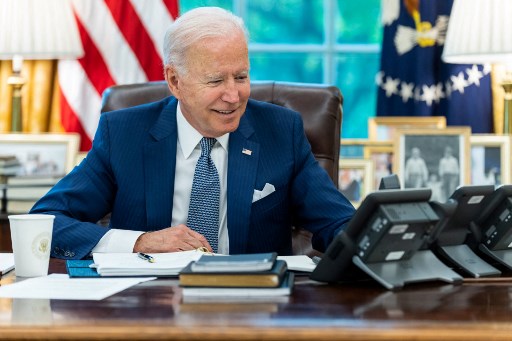
by Stuart Williams with Sebastian Smith in Washington
PARIS, France (AFP) — US President Joe Biden and his French counterpart Emmanuel Macron had a “friendly” phone call Wednesday to defuse a deep row over submarine sales to Australia, promising to meet in person to repair the transatlantic relationship.
The call, which the White House said lasted about 30 minutes, was the first between Biden and Macron since France recalled its ambassador over the surprise US announcement of a deal to build nuclear submarines for Australia — scuppering a previous French deal to sell conventional submarines.
Paris called the US-Australian plan, which was launched as part of a new Indo-Pacific security group along with Britain, a stab in the back and also pulled its ambassador from Australia.
In a joint statement after the call, the two leaders vowed to launch “in-depth consultations… for ensuring confidence” and to meet in Europe at the end of October. The statement also said Macron would order France’s ambassador back to Washington next week.
White House Press Secretary Jen Psaki told reporters the talk “was friendly” and Biden was “hopeful this was a step in returning to normal.”
The statement said the US recognised the need for stronger European defence to complement the NATO military alliance, a key idea repeatedly floated by the French leader.
In what amounted to an acknowledgement of French anger, the English language version of the statement issued by the White House said that the management of the dueling submarine deals “would have benefited from open consultations among allies.”
The French-language version issued by the Elysee Palace was even more explicit, saying consultations “would have avoided this situation.”
Asked if Biden had apologized to Macron, Psaki said “he acknowledged there could have been greater consultation.”
There was no word about where the October meeting will be but Biden will already be in Rome and Glasgow at that time for the G20 and COP26 climate summits.
‘Good messages’
France was outraged that Australia negotiated with Washington and London in secret, which French Foreign Minister Jean-Yves Le Drian denounced as “treachery” and a “stab in the back”.
As well as a huge commercial setback, the loss of the deal was also a blow to France’s security strategy in the Indo-Pacific region, where it has a presence through overseas territories.
The submarine row plunged Franco-US ties into what some analysts viewed as the most acute crisis since the US-led invasion of Iraq in 2003, which Paris opposed.
After four years of tumultuous relations with ex-president Donald Trump, the spat also dashed hopes of a complete reset under Biden, who took office in January aiming to rebuild frazzled ties with Europe.
Wednesday’s call sought at least to settle the mood, with the White House soon after releasing a photo of Biden smiling while speaking to Macron.
“The messages from the call are good. It was recognised that communication should have been better,” said Benjamin Haddad, director of the Europe Center at the Atlantic Council, a think tank.
“The US understood that the main shock in Paris did not come so much from the commercial aspect as from the breakdown in confidence,” he told AFP.
In another welcome step for Paris, the joint statement added that the US committed “to reinforcing its support to counter-terrorism operations” in the Sahel region of Africa, where French forces are deployed to fight jihadists.
‘Non-existent dialogue’
Observers and some of France’s European partners had begun wondering how and when Macron would call an end to the face-off, which is playing out just seven months ahead of French presidential elections.
British Prime Minister Boris Johnson showed he was out of patience, using a French-English mix to say it was “time for some of our dearest friends around the world to ‘prenez un grip’ (get a grip).”
The EU’s top diplomat Josep Borrell meanwhile called for “stronger confidence” with the US as he met Secretary of State Antony Blinken in New York.
There is still no indication of France making up with Australia, which says its decision to opt for far more capable nuclear-powered submarines is part of a longterm strategy to contain China’s rising presence in the Indo-Pacific.
An Elysee official, who asked not to be named, said no decision has been made on the French ambassador’s return to Canberra while no call has been scheduled with Australian Prime Minister Scott Morrison.
© Agence France-Presse







